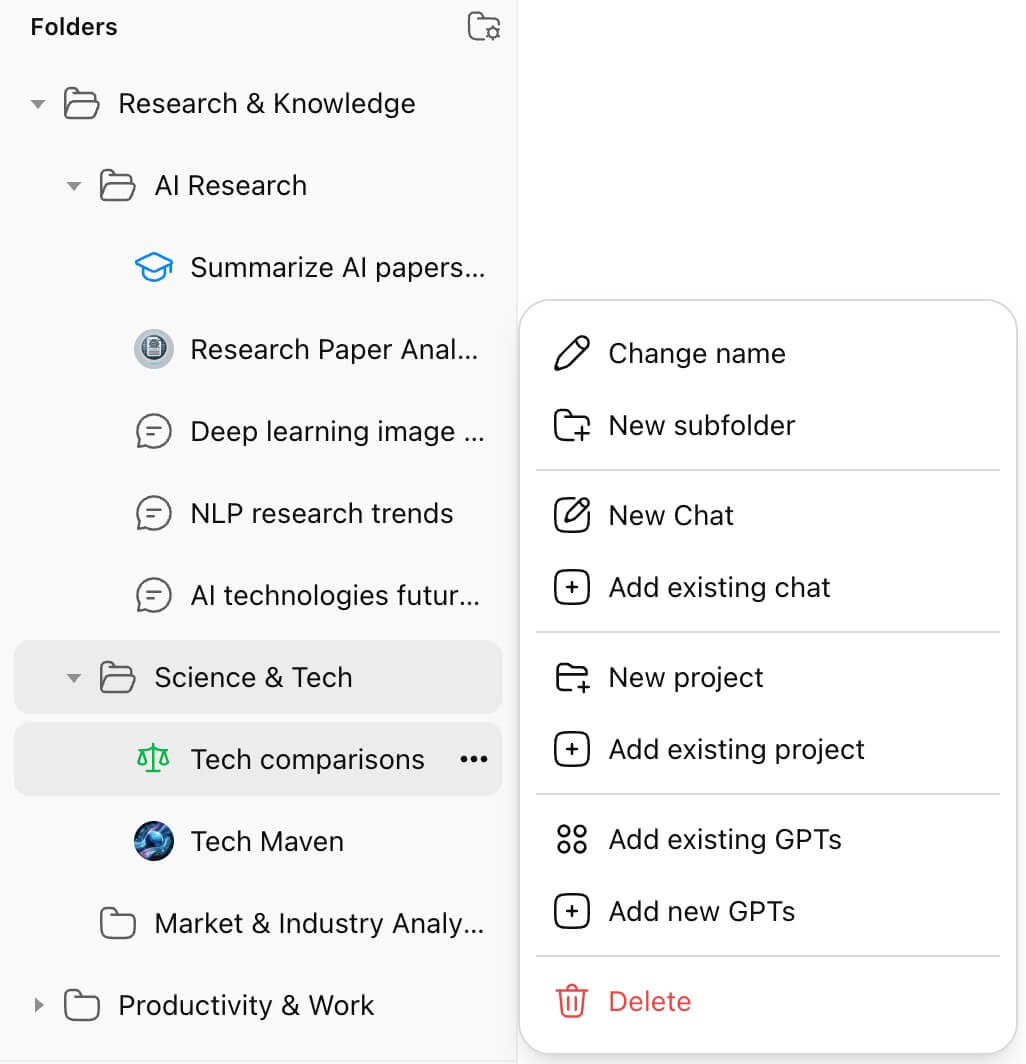ChatGPT Projects Are Free. What About ChatGPT Folder Chrome Extensions? Is There a Better Solution?
As ChatGPT starts offering Projects to free users, many are wondering: what does this mean for Chrome extensions that provide folder-based content organization? Will they become obsolete? Or is there still room for innovation in managing AI-generated content?
In this post, I want to share my thoughts on Projects, their limitations, the continuing value of Chrome extensions, and the philosophy behind ChatGPT Mods, our plugin that reimagines content management for the modern ChatGPT user.
Current State and Limitations of ChatGPT Projects
Projects provide a centralized way to organize conversations, making it easier to find, access, and manage specific topics. For users, this is a welcome addition: you can create a Project, save relevant conversations, and navigate through your history more efficiently.
However, Projects are far from perfect.
- No support for sub-projects: You cannot nest Projects to create hierarchies. This is limiting for power users who manage large volumes of conversations.
- Feature gaps: Essential organizational tools like tagging, batch operations, sorting, and filtering are either missing or limited. Users who rely on more advanced management workflows may feel constrained.
- Not a replacement for folders: Projects do not replace the flexibility and freedom that folders provide. While Projects emphasize centralized management, folders allow users to impose their own logic and structure, which is often more nuanced.
In short, while Projects are a step forward, they do not solve every content management problem. This is an opportunity, not a threat, for developers.
The Value and Challenges of Chrome Extensions
For years, Chrome extensions have filled gaps left by official tools, providing folder systems, nested organization, and advanced workflows for managing conversations and GPT models. They enabled users to:
- Create hierarchies for better content discovery
- Quickly move, tag, and sort conversations
- Maintain personal workflows that Projects alone cannot support
When Projects were introduced, some developers worried:
“Does this mean our extensions are now obsolete?”
The answer is no. In fact, the release of Projects highlights why extensions are still valuable. Projects have limitations that extensions can address, such as nested organization, multi-dimensional categorization, and integration with user-created GPTs. Extensions remain a playground for innovation and refinement, allowing developers to experiment with features that the official interface might never implement.
ChatGPT Mods: A Superset of Projects
At ChatGPT Mods, we took a bold approach: instead of competing with Projects, we embraced them and went further. We upgraded our folder system to become a superset of Projects, adding features that make content management more flexible and powerful than ever.
Here’s what we did:
- Folders can embed Projects: You can organize Projects inside folders, maintaining your preferred hierarchy while leveraging Projects’ convenience.
- Folders can embed GPTs: Your AI models can live inside the same organizational structure, making content and tools accessible in one place.
- Unified interface: Conversations, Projects, and GPTs coexist in a single, clear interface, eliminating fragmentation and confusion.

With this approach, users can finally manage ChatGPT content in a way that feels intuitive, scalable, and tailored to their workflow.
Looking Ahead: The Future of Content Management
I firmly believe that there is always a better way to organize content. Neither Projects nor folders are the final solution—they are tools that evolve with users’ needs and technological capabilities.
The future may bring:
- Smarter organization tools: AI-assisted categorization, search, and prioritization of conversations
- Dynamic hierarchies: Folders that automatically adapt based on usage, tags, and context
- Cross-platform continuity: Unified content management across web, mobile, and extension environments
For developers, the lesson is clear: innovation never stops. Even as official features evolve, there is immense opportunity to enhance user experience, streamline workflows, and experiment with new organizational paradigms.
Conclusion
Projects are not the end of content management, and extensions are far from obsolete. By building flexible, user-centered tools like ChatGPT Mods, we can make content organization more intuitive, efficient, and scalable than ever before.
The journey of improving content management is ongoing. As users and developers, we should embrace experimentation, anticipate new needs, and never settle for the status quo. With the right tools and mindset, managing ChatGPT content can be smarter, clearer, and more empowering than ever.
